Bringing a new puppy home is an exciting time, filled with the anticipation of joyful moments and the responsibility of ensuring their well-being. Amidst the flurry of choosing the right toys, understanding training methods, and selecting the perfect bed, one of the most critical decisions you’ll make is about their nutrition. Selecting the Best Healthy Dog Food For Puppies is paramount for their healthy growth and development. This guide, curated by seasoned pet care professionals and drawing upon extensive research, will help you navigate the world of puppy nutrition, ensuring your furry friend gets the best start in life.
Understanding Puppy Nutrition: The Foundation of Health
Puppies are in a phase of rapid growth and development, requiring a different nutritional profile than adult dogs. Their food needs to support the formation of strong bones, healthy organs, a robust immune system, and cognitive development. This means puppy food formulas are specifically designed to be nutrient-dense, often featuring higher levels of protein, healthy fats, and essential vitamins and minerals.
Key Differences: Puppy Food vs. Adult Dog Food
- Protein and Fat Content: Puppy food generally contains higher levels of protein to support muscle development and healthy fats for energy and nutrient absorption.
- Essential Nutrients: Puppies need specific nutrients like DHA for brain and vision development, and adequate levels of calcium and phosphorus for strong skeletal growth.
- Calorie Density: While puppies need more calories per pound than adult dogs to fuel their growth, the energy density needs careful management to prevent them from growing too quickly, which can lead to orthopedic issues, particularly in large and giant breeds.
How to Choose the Best Healthy Dog Food for Puppies
Selecting the right food can seem daunting with the vast array of options available. However, by focusing on a few key factors, you can make an informed decision that prioritizes your puppy’s health.
Expert Recommendations and Key Considerations
When seeking the best healthy dog food for puppies, always consult your veterinarian. They can provide personalized recommendations based on your puppy’s specific breed, size, health status, and any potential sensitivities. Beyond professional advice, consider these crucial aspects:
1. AAFCO Nutritional Standards
Ensure the puppy food you choose meets the nutritional standards set by the Association of American Feed Control Officials (AAFCO). Look for a statement on the packaging that reads “complete and balanced” for growth or “all life stages.” This indicates that the food provides all the necessary nutrients for your puppy’s development.
2. High-Quality Ingredients
The foundation of any good puppy food is its ingredient list. Look for recognizable, whole food ingredients.
- Protein Sources: Opt for foods where the primary ingredient is a high-quality animal protein source such as chicken, turkey, lamb, or fish. These are crucial for muscle development.
- Whole Grains and Vegetables: Ingredients like brown rice, barley, sweet potatoes, and peas provide essential carbohydrates for energy, fiber for digestion, and a range of vitamins and minerals.
- Beneficial Fats: Healthy fats, including omega-3 and omega-6 fatty acids (often derived from fish oil or flaxseed), are vital for skin and coat health, as well as cognitive function.
3. Avoidance of Unnecessary Fillers and Additives
Just as important as what’s in the food is what’s not. Be wary of:
- Excessive Fillers: Ingredients like corn, wheat, and soy, especially when listed as primary ingredients, can offer minimal nutritional value and may be harder for some puppies to digest.
- Artificial Colors, Flavors, and Preservatives: These offer no nutritional benefit and can sometimes trigger sensitivities in puppies.
4. Breed Size and Weight Considerations
Puppies have varying growth rates and needs based on their expected adult size.
- Small and Medium Breeds: These puppies typically reach their adult size faster and benefit from formulas designed for growth. Their kibble size should be appropriate for their small mouths.
- Large and Giant Breeds: These breeds require carefully controlled growth to prevent skeletal problems. Look for formulas specifically labeled for “large breed puppies.” These often have a more balanced calcium-to-phosphorus ratio and controlled calorie content to ensure they grow at a healthy, steady pace.
5. Palatability
While nutrition is paramount, your puppy also needs to enjoy their food. If your puppy is a picky eater, consider foods with appealing flavors and textures. Sometimes, mixing in a small amount of wet food or a dog-safe topper can entice them.
Top Picks for the Best Healthy Dog Food for Puppies
Based on expert recommendations and common considerations for puppy nutrition, here are some highly-regarded options:
Overall Best Puppy Food
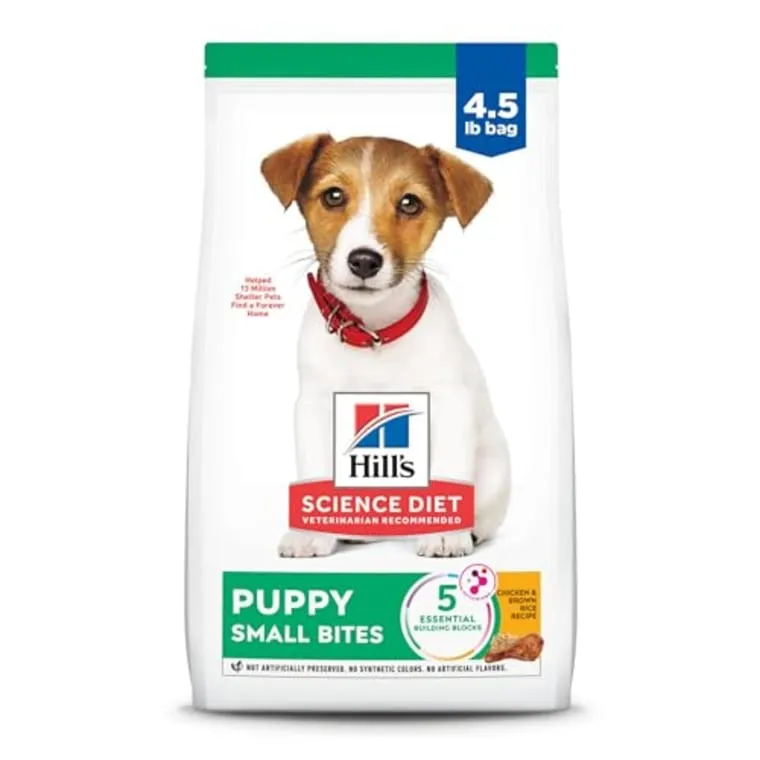 Hill’s Science Diet Puppy Small Bites Dry Dog FoodHill’s Science Diet Puppy Small Bites Dry Dog Food is a vet-recommended choice for its balanced formulation. It provides essential vitamins and minerals, including omega-3 fatty acids from fish oil to support brain and eye development, and a blend of vitamins E and C for immune system support. The small kibble size is ideal for easy digestion and consumption by puppies. This formula is suitable for puppies with an expected adult weight of up to 120 lbs.
Hill’s Science Diet Puppy Small Bites Dry Dog FoodHill’s Science Diet Puppy Small Bites Dry Dog Food is a vet-recommended choice for its balanced formulation. It provides essential vitamins and minerals, including omega-3 fatty acids from fish oil to support brain and eye development, and a blend of vitamins E and C for immune system support. The small kibble size is ideal for easy digestion and consumption by puppies. This formula is suitable for puppies with an expected adult weight of up to 120 lbs.
Best Budget-Friendly Puppy Food
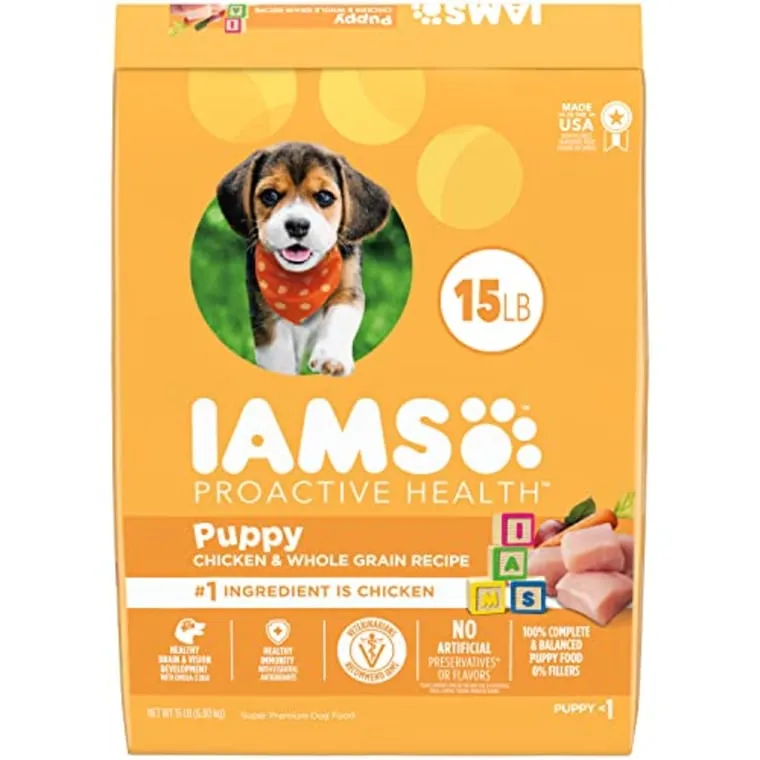 IAMS Proactive Health Smart Puppy Dry Dog FoodIAMS Proactive Health Smart Puppy Dry Dog Food offers excellent nutritional value at an accessible price point. Made with chicken and whole grains, it’s enriched with omega-3 fatty acids to promote healthy brain and vision development in puppies. This is a reliable option for owners looking for quality nutrition without a premium cost, suitable for puppies up to 50 lbs expected adult weight.
IAMS Proactive Health Smart Puppy Dry Dog FoodIAMS Proactive Health Smart Puppy Dry Dog Food offers excellent nutritional value at an accessible price point. Made with chicken and whole grains, it’s enriched with omega-3 fatty acids to promote healthy brain and vision development in puppies. This is a reliable option for owners looking for quality nutrition without a premium cost, suitable for puppies up to 50 lbs expected adult weight.
Best Tasting Puppy Food
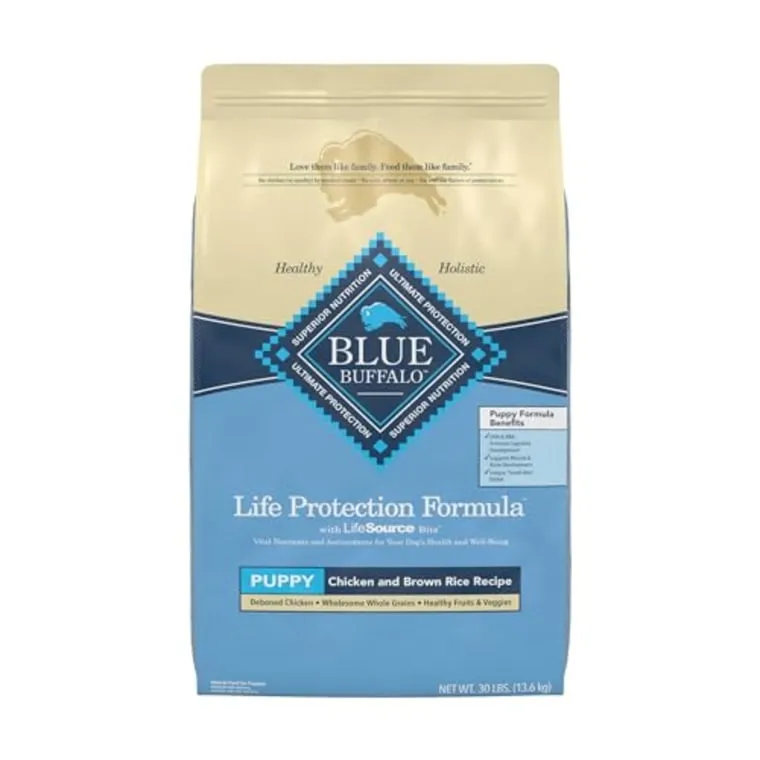 Blue Buffalo Life Protection Formula Chicken & Brown Rice Dry Dog FoodBlue Buffalo Life Protection Formula Chicken & Brown Rice Dry Dog Food is a favorite for its palatability. Puppies often devour this kibble due to its delicious taste, making it an excellent choice for fussy eaters. It’s packed with vitamins, antioxidants, and minerals to support immune health, and the small kibble size is easy for puppies to manage. This formula is suitable for puppies up to 60 lbs expected adult weight.
Blue Buffalo Life Protection Formula Chicken & Brown Rice Dry Dog FoodBlue Buffalo Life Protection Formula Chicken & Brown Rice Dry Dog Food is a favorite for its palatability. Puppies often devour this kibble due to its delicious taste, making it an excellent choice for fussy eaters. It’s packed with vitamins, antioxidants, and minerals to support immune health, and the small kibble size is easy for puppies to manage. This formula is suitable for puppies up to 60 lbs expected adult weight.
Best Wet Food for Puppies
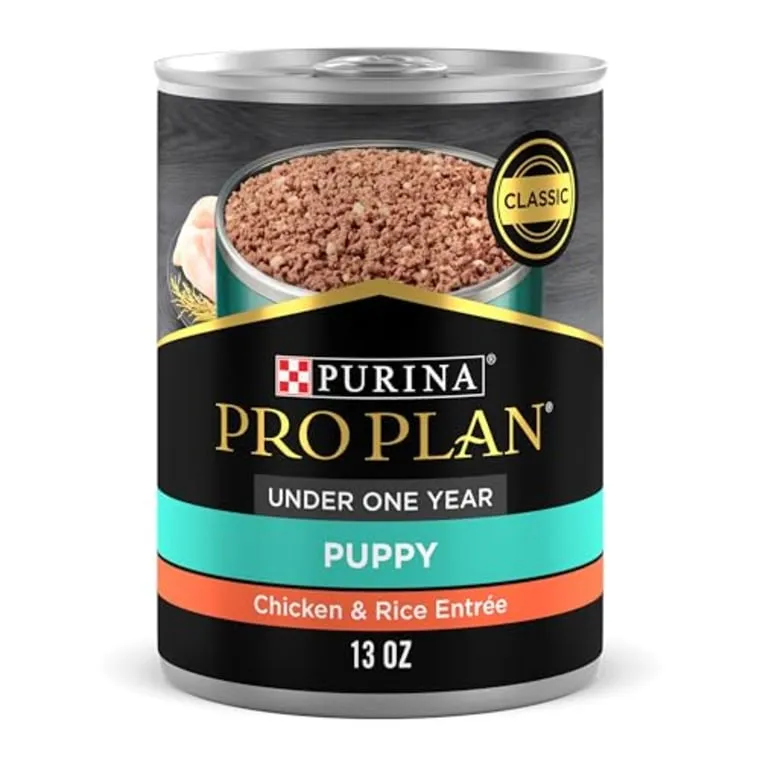 Purina Pro Plan High Protein Puppy Food PatePurina Pro Plan High Protein Puppy Food Pate is a highly recommended wet food option. This chicken and rice formula is rich in essential vitamins and minerals to support coat health and the immune system. Wet food can be a great way to add hydration to a puppy’s diet and can be particularly appealing to picky eaters or for mixing with dry kibble. This is suitable for puppies with an expected adult weight of up to 100 lbs.
Purina Pro Plan High Protein Puppy Food PatePurina Pro Plan High Protein Puppy Food Pate is a highly recommended wet food option. This chicken and rice formula is rich in essential vitamins and minerals to support coat health and the immune system. Wet food can be a great way to add hydration to a puppy’s diet and can be particularly appealing to picky eaters or for mixing with dry kibble. This is suitable for puppies with an expected adult weight of up to 100 lbs.
Best for Large Breed Puppies
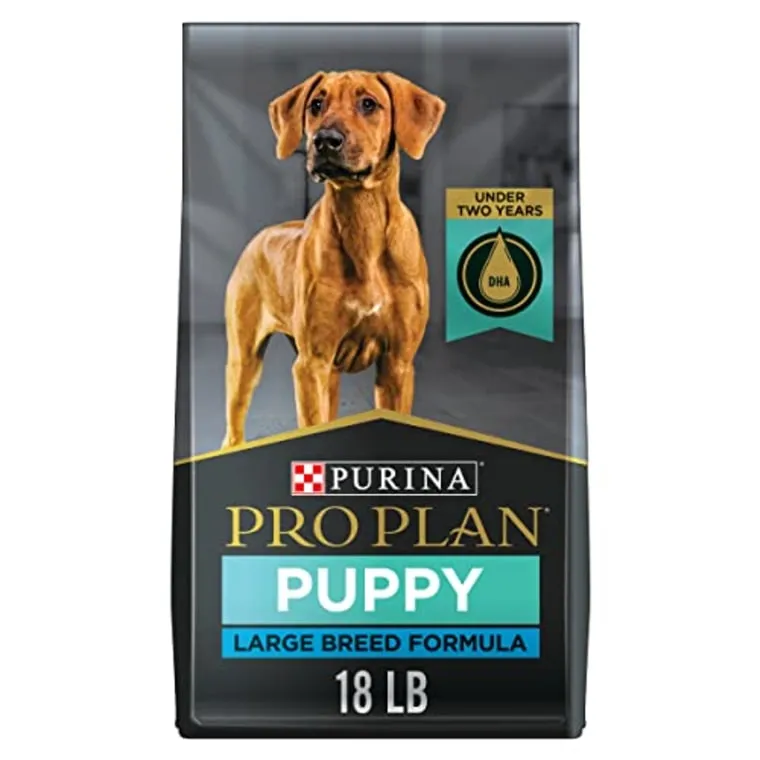 Purina Pro Plan Large Breed Dry Puppy FoodPurina Pro Plan Large Breed Dry Puppy Food is specifically formulated for puppies destined to be over 50 pounds as adults. It contains fish oil to support healthy brain and visual development, along with nutrients to promote a healthy rate of development, crucial for preventing orthopedic issues in growing large breeds. This formula is recommended for puppies up to 2 years old.
Purina Pro Plan Large Breed Dry Puppy FoodPurina Pro Plan Large Breed Dry Puppy Food is specifically formulated for puppies destined to be over 50 pounds as adults. It contains fish oil to support healthy brain and visual development, along with nutrients to promote a healthy rate of development, crucial for preventing orthopedic issues in growing large breeds. This formula is recommended for puppies up to 2 years old.
Best for Small Breed Puppies
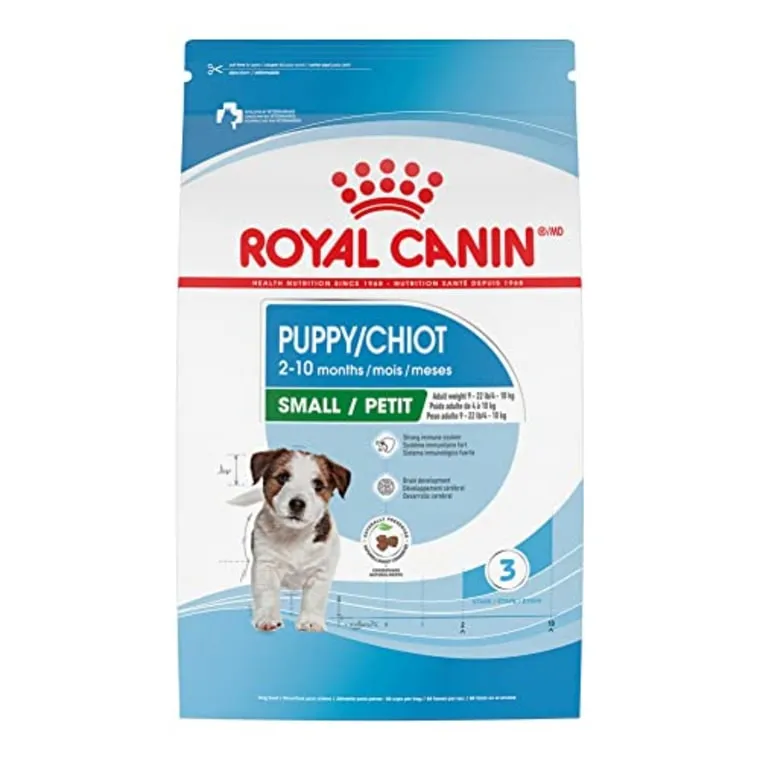 Royal Canin Small Puppy Dry Dog FoodRoyal Canin Small Puppy Dry Dog Food is a top choice for veterinarians and owners alike. Designed for puppies weighing between 9-22 lbs at adulthood, the kibble is perfectly sized for small mouths. It contains omega-3 fatty acids and vitamins C and E to support healthy growth and energy levels, contributing to a healthy coat and skin.
Royal Canin Small Puppy Dry Dog FoodRoyal Canin Small Puppy Dry Dog Food is a top choice for veterinarians and owners alike. Designed for puppies weighing between 9-22 lbs at adulthood, the kibble is perfectly sized for small mouths. It contains omega-3 fatty acids and vitamins C and E to support healthy growth and energy levels, contributing to a healthy coat and skin.
Best Subscription Dog Food
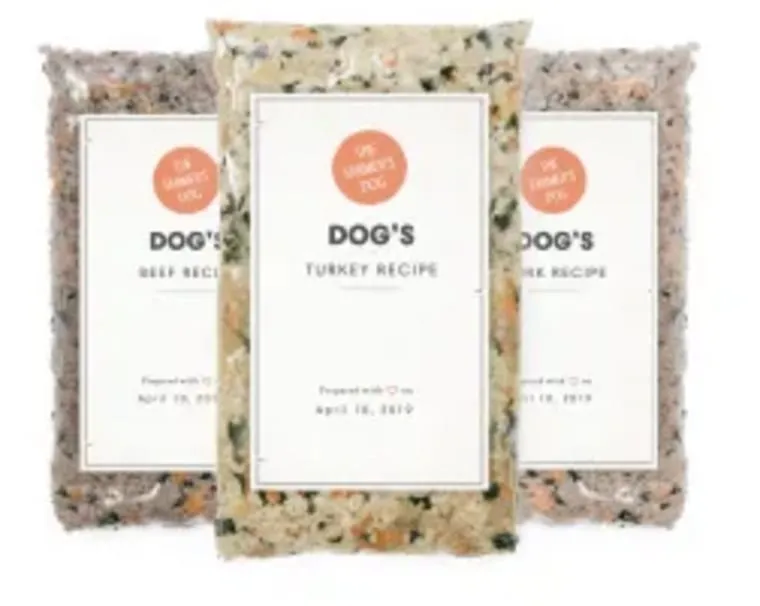 The Farmer’s Dog Subscription Dog FoodThe Farmer’s Dog offers a convenient subscription service for freshly prepared, human-grade dog food. Each meal is custom-portioned based on your puppy’s individual needs, determined through a detailed questionnaire. Developed with board-certified veterinary nutritionists, this option provides a highly palatable and nutrient-dense diet for optimal growth.
The Farmer’s Dog Subscription Dog FoodThe Farmer’s Dog offers a convenient subscription service for freshly prepared, human-grade dog food. Each meal is custom-portioned based on your puppy’s individual needs, determined through a detailed questionnaire. Developed with board-certified veterinary nutritionists, this option provides a highly palatable and nutrient-dense diet for optimal growth.
Best Fresh Food for Puppies
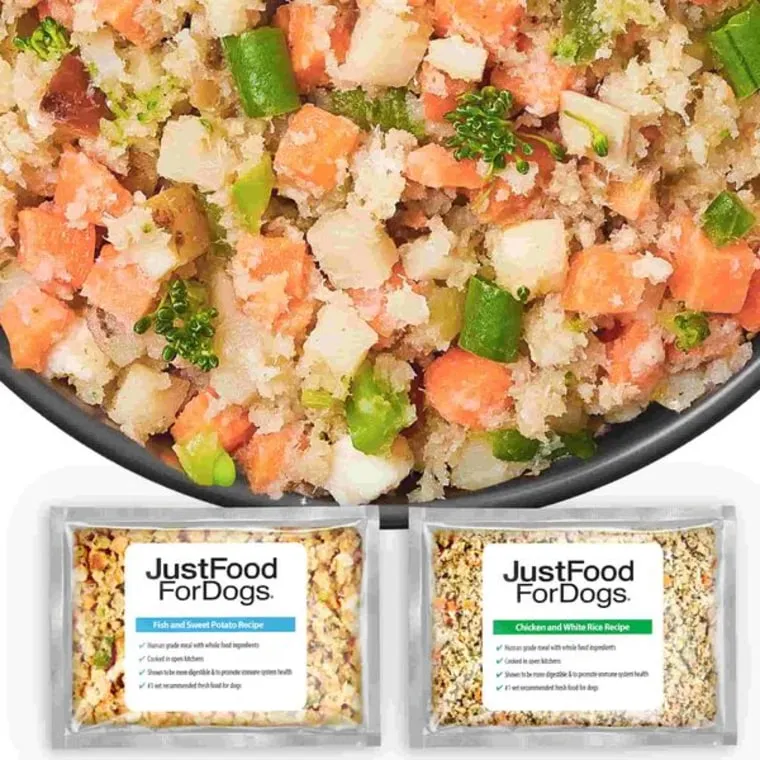 Just Food for Dogs Puppy Variety PackJust Food for Dogs provides gently cooked, whole-food meals recommended by veterinarians. The Puppy Variety Pack is made for all life stages and includes pre-cooked ingredients that are nutritionally balanced for growing puppies. These meals can be stored frozen for up to 18 months and offer a minimally processed, highly digestible option.
Just Food for Dogs Puppy Variety PackJust Food for Dogs provides gently cooked, whole-food meals recommended by veterinarians. The Puppy Variety Pack is made for all life stages and includes pre-cooked ingredients that are nutritionally balanced for growing puppies. These meals can be stored frozen for up to 18 months and offer a minimally processed, highly digestible option.
Best No-Frills Puppy Food
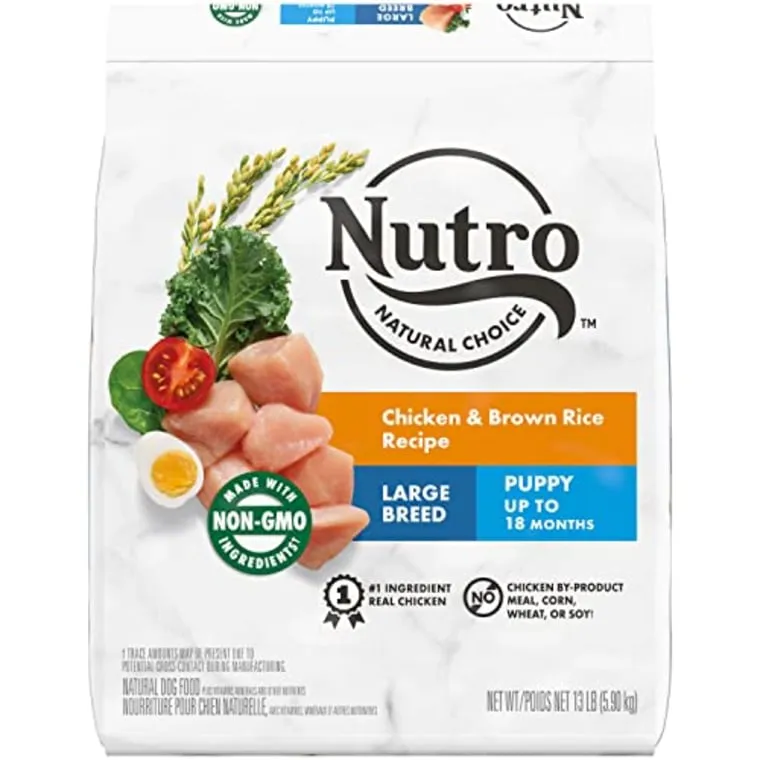 Nutro Natural Choice Puppy Dry Dog FoodNutro Natural Choice Puppy Dry Dog Food is a high-protein recipe that supports a healthy coat, skin, bones, and immune system. It’s a straightforward, reliable option that aids in healthy digestion and is well-tolerated by many puppies. This formula is suitable for puppies up to 60 lbs expected adult weight.
Nutro Natural Choice Puppy Dry Dog FoodNutro Natural Choice Puppy Dry Dog Food is a high-protein recipe that supports a healthy coat, skin, bones, and immune system. It’s a straightforward, reliable option that aids in healthy digestion and is well-tolerated by many puppies. This formula is suitable for puppies up to 60 lbs expected adult weight.
Best High-Protein Puppy Food
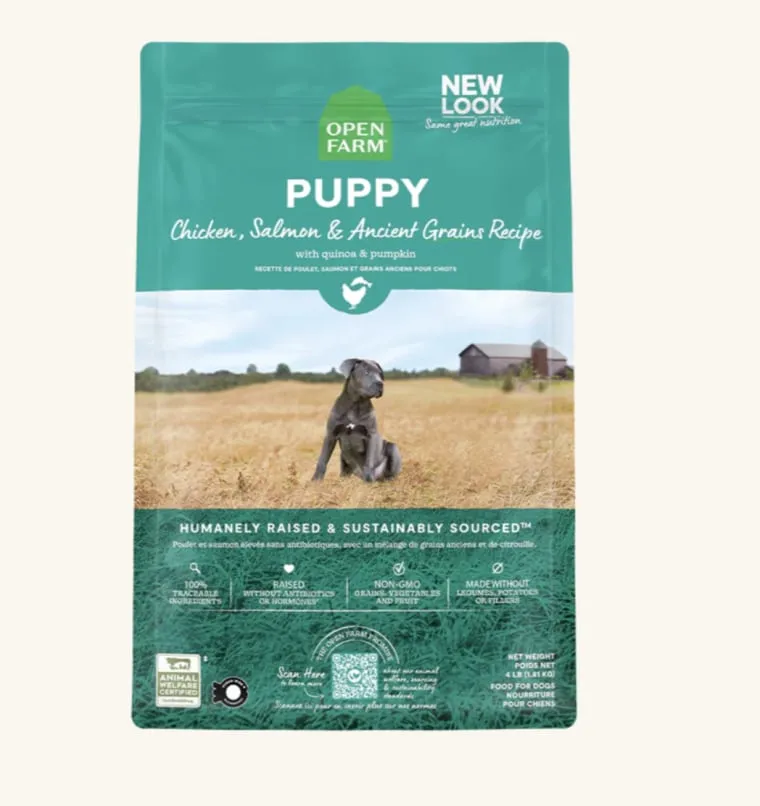 Open Farm Ancient Grains High-Protein Puppy FoodOpen Farm Ancient Grains High-Protein Puppy Food is praised for its fresh ingredients and high protein content from a blend of chicken, salmon, and pork, supporting healthy brain development. It incorporates ancient grains like oats, millet, and quinoa, offering a nutrient-rich profile. Veterinary nutritionists formulate their food to meet AAFCO standards.
Open Farm Ancient Grains High-Protein Puppy FoodOpen Farm Ancient Grains High-Protein Puppy Food is praised for its fresh ingredients and high protein content from a blend of chicken, salmon, and pork, supporting healthy brain development. It incorporates ancient grains like oats, millet, and quinoa, offering a nutrient-rich profile. Veterinary nutritionists formulate their food to meet AAFCO standards.
Best for Sensitive Stomachs
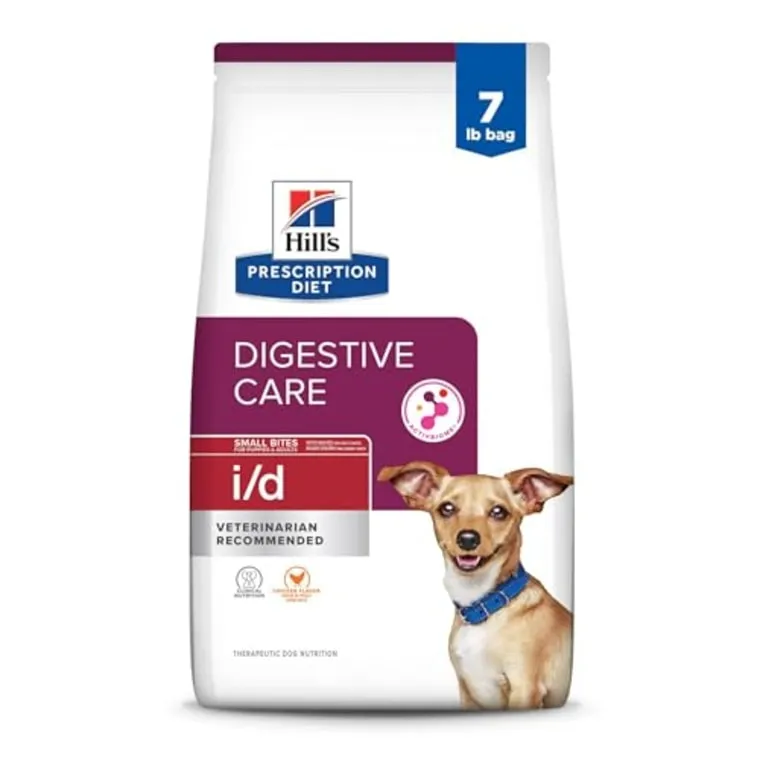 Hill’s Prescription Diet i/d Digestive Care Dry FoodFor puppies experiencing digestive issues, Hill’s Prescription Diet i/d Digestive Care Dry Food is a veterinary-prescribed option. Its proprietary ActiveBiome+ ingredient blend helps regulate gut bacteria and supports regular bowel movements. It also replenishes lost nutrients with vitamins and antioxidants, but requires veterinary approval for purchase.
Hill’s Prescription Diet i/d Digestive Care Dry FoodFor puppies experiencing digestive issues, Hill’s Prescription Diet i/d Digestive Care Dry Food is a veterinary-prescribed option. Its proprietary ActiveBiome+ ingredient blend helps regulate gut bacteria and supports regular bowel movements. It also replenishes lost nutrients with vitamins and antioxidants, but requires veterinary approval for purchase.
Feeding Your Puppy: Routine, Portions, and Transitions
Establishing a consistent feeding routine is crucial for puppies.
Feeding Frequency and Amount
- 6-12 Weeks: Feed puppies at least three times a day to maintain energy levels and support their fast metabolism.
- 4-6 Months: Transition to twice-daily feedings.
- Large Breeds: Feed three meals daily until about 6 months of age, then transition to twice daily.
It’s normal for puppies under 6 months to still seem hungry after their allotted meals due to their rapid growth. If your puppy shows signs of hunger (sniffing, whining, pawing), it’s generally okay to offer a little extra food or an additional small meal. Always consult your veterinarian for precise portion recommendations based on your puppy’s weight, age, and activity level, or follow the feeding guidelines on the food packaging. Crucially, ensure your puppy is eating enough to prevent hypoglycemia, a dangerous drop in blood sugar.
Transitioning to Adult Food
The age at which you switch from puppy food to adult dog food varies:
- Small to Medium Breeds: Typically between 6 to 14 months.
- Large to Giant Breeds: Often later, from 12 months up to 2 years for giant breeds, to ensure controlled growth.
Always consult your veterinarian for the best timing for your specific puppy.
Dry Food vs. Wet Food: What’s Best for Your Puppy?
Both dry kibble and wet (canned) food have their advantages:
- Dry Food: Generally more economical, easier to store, and can help maintain dental hygiene.
- Wet Food: Higher moisture content, which aids in hydration and can be more palatable for picky eaters. It’s also often less processed.
Many experts suggest a combination of both, or adding moisture-rich toppers like dog-safe fruits and vegetables to kibble. Avoid feeding 100% processed kibble; a varied diet ensures better hydration and nutrient intake.
Supplements and Special Diets for Puppies
- Supplements: If your puppy is on a balanced diet, supplements are usually unnecessary. However, underweight puppies or those with specific health conditions may benefit from them, as advised by a vet. Toppers like pumpkin or blueberries can boost immunity. Probiotics can also help manage stress during new environments and support gut health.
- Raw Diets: Veterinarians generally advise against raw diets for puppies due to the risk of bacterial contamination (e.g., Salmonella, E. coli) and potential nutritional imbalances.
- Grain-Free Diets: Unless your puppy has a diagnosed grain intolerance or a veterinarian recommends it, grain-free diets are not inherently better. Some grain-free diets have been linked to heart conditions, so always discuss such changes with your vet.
- Food Allergies: True food allergies in puppies are rare, developing over time with repeated exposure. Itching, paw licking, and ear infections are more often linked to environmental factors. Gastrointestinal issues like diarrhea can also stem from other causes like parasites, rather than diet.
Choosing the best healthy dog food for puppies is a cornerstone of responsible pet ownership. By understanding their unique nutritional needs, consulting with veterinary professionals, and carefully selecting high-quality food, you set your puppy on the path to a long, healthy, and happy life.
